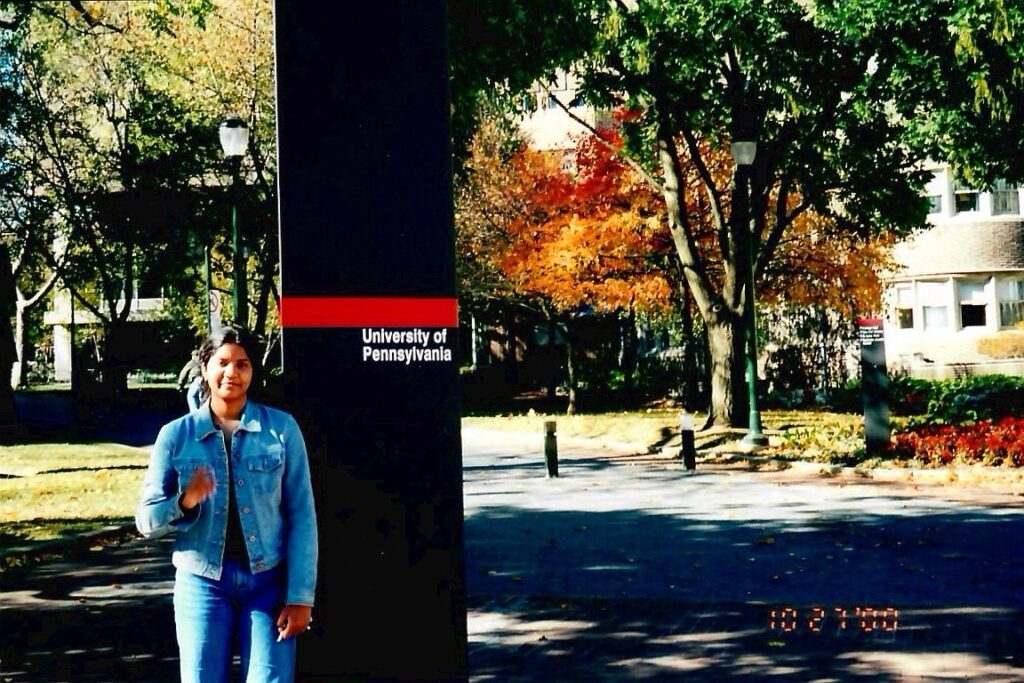
By Ian Scheffler
For Archana Vemulapalli (GEN’01, CGS’05) one of the most important workplace lessons is to treat your role with respect. “Sometimes I see people who are trying to work towards something before excelling in what they have at hand,” she says. “When you excel at what you have at hand, automatically people notice and they’re willing to tap you for something else.”
That lesson has taken Vemulapalli from Penn Engineering to the frontier of artificial intelligence (AI). After stints at Amazon Web Services (AWS), where she led product and strategy for AI and machine learning (ML), and the municipal government of Washington, D.C., where she served as CTO, this January, she took on the role of Corporate Vice President of Global Commercial Sales at Advanced Micro Devices, Inc. (AMD), the high-performance computing company and one of the leading makers of graphics processing units (GPUs), the specialized chips powering today’s AI revolution.
“People will always give a chance to someone that executes, that solves problems, and that’s showing up, ready to be a part of the solution and not be the one that only raises problems,” she says. “Having that intentionality makes a big difference.”
Vemulapalli’s journey started half a world away in India, where she grew up in a family that encouraged her interest in science from a young age. “I was probably in third grade when I decided I wanted to be a scientist,” she recalls.
She wasn’t sure, at first, whether she wanted to become a doctor or biomedical engineer. But, when she learned about network science, she found herself drawn to the way that networks undergird almost everything. “Infrastructure is super critical,” she says.
Nowhere is this more true than AI. “You think of infrastructure as effectively the backbone. When you talk about the vast and extensive computational requirements that the world of AI has, your infrastructure is essential.”

After studying electronics and communications engineering at the University of Madras, Vemulapalli decamped for Penn Engineering, where she earned a master’s in Telecommunications and Networking. Drawn by Penn’s reputation for blending theory with real-world application, Vemulapalli was eager to broaden her skills beyond the classroom.
With the same zeal she later applied to grading papers as a teaching assistant and in conducting academic research, Vemulapalli threw herself into life at Penn. “Penn is almost like a second home for me,” she says. “What I loved about my program was it gave me exposure to how I could put engineering to work practically, because the faculty were a combination of tenured professors and some from industry.”
She also took classes at Wharton, which introduced her to business. “Penn gave me a very well-rounded perspective on how to deepen your engineering skills, but also how to frame engineering in the context of what it means for business, which I think honestly has been immensely valuable for me throughout my career.”
At first, Vemulapalli worked as a network engineer. Then she transitioned to operations, before making the leap to consulting. “I was very intentional about the fact that in every role I took, I wanted to have the opportunity to learn as much as I contributed,” she says. “And that almost always meant that the next role I took had to be something different than what I did before.” Before long, she was looking for leadership roles.
As Vemulapalli sees it, leadership isn’t just the domain of the C-suite. “It happens in classrooms,” she points out. “When you’re the class monitor — how do you get your classmates to listen to something that has to be done?”
In a sense, her mindset at Penn Engineering had been preparing her for leadership in the corporate world, long before she found herself in the C-suite. “I believe leadership is actually about knowing yourself and becoming the best version of yourself,” she says.
At each step of her journey, Vemulapalli has also focused on making a difference. In the public sector, as CTO of Washington, D.C., she led an effort to expand the city’s high-speed internet service so that residents could access the internet from parks and schools. “We really wanted to solve for equity in a meaningful way,” she says. “We rolled out gigabit connectivity to all the schools, and we made sure all of the parking lots of all the public schools had Wi-Fi, so if parents were coming to drop their kids off and they had to connect, they could.”
Vemulapalli hopes to have a similar impact in AI. “The potential of AI is tremendous,” she says, pointing to scientific research that leverages AI in antibiotic discovery. “Every bit of advancement we make in infrastructure technology is materially going to open up for us new doors in how we build AI applications.”
To learn more about AI at Penn Engineering, please visit the Raj and Neera Singh Program in AI website.
